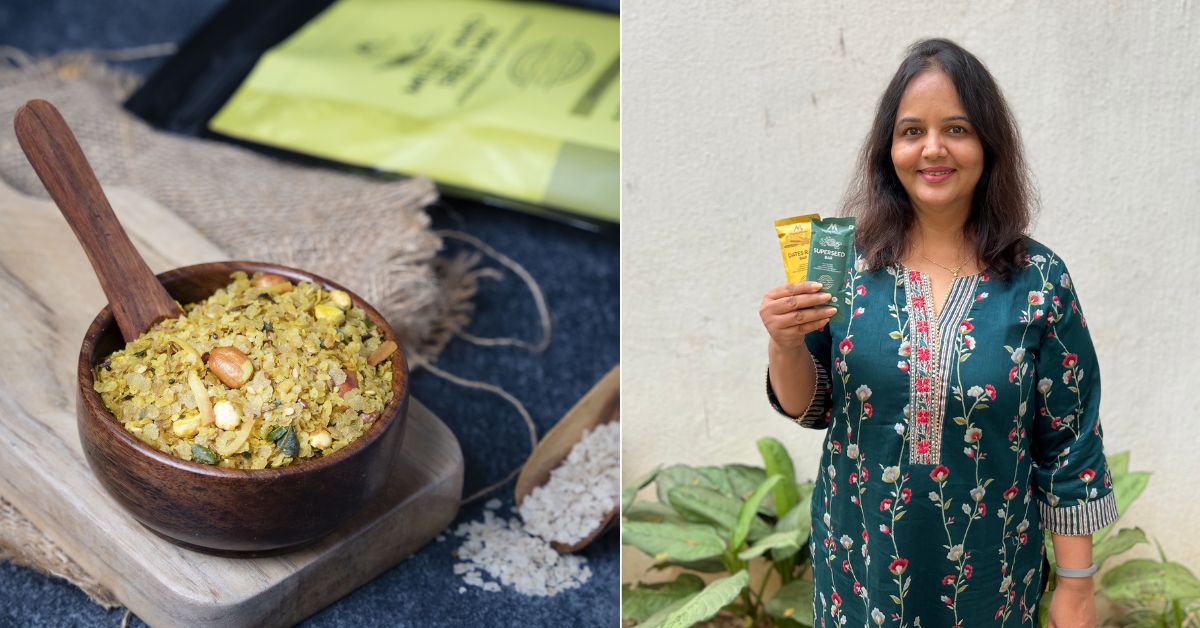Sahil Jain, a chartered accountant with a successful career in a Mumbai-based multinational company, found himself trapped in a corporate routine he couldn’t stand. As soon as the office clock struck 6, he would pack his bags to leave for home. Even working an extra minute at the company felt unbearable to him.
“Once, I finished all my work by 3, but I still waited till 6. When I started packing my bag, my senior asked me where I was going. He told me to sit and leave only after the director. That’s exactly what I didn’t want,” he recalls.
“After a year-and-a-half, I realised that corporate culture was not my cup of tea. It became clear to me that day: I wanted to break free from the corporate environment and pursue my passion for building my own brand,” he adds.
Drawing inspiration from his mother Meena, a seasoned nutritionist, Sahil embarked on a journey to create nutritious and innovative food products. Together, the mother-son duo experimented with various health-conscious recipes, such as laddu bars, vegetable chips, and millet-based products.
With their company, Mighty Millets, they built a profitable venture, developing a customer base with over 50 hotels, such as the prestigious Taj Group and JW Marriott in Pune, Bengaluru, Delhi, and Mumbai. Last year, they clocked an annual revenue of Rs 50 lakh and aim to double their sales for the 2024-2025 financial year.

In a conversation with The Better India, the co-founders unveiled the remarkable journey of nurturing their food startup from inception to soaring heights.
From kitchen to commerce: The birth of a brand
Sahil’s mother, Meena, has a flair for creating delicious yet health-conscious recipes. As a nutritionist, she had long been helping clients in India and abroad achieve their wellness goals. Sahil, a self-proclaimed foodie with an entrepreneurial spirit, saw an opportunity to combine their strengths and create something unique in the food sector.
The inception of Mighty Millets was not an overnight decision but a result of careful consideration and experimentation, Sahil informs. Every weekend, he, along with a few friends, would join Meena in her kitchen for food trials.
“From traditional favourites like vada pav to regional specialties like Hyderabadi toast, I would cook a diverse range of food items for them. We experimented to find unique food items we could sell, but it was all unhealthy. As a nutritionist, I didn’t want to promote junk food,” Meena says.
“That’s when I remembered how my clients would suggest I commercialise the health conscious recipes I recommended to them,” she adds.
With Meena stepping in, Sahil shifted their focus to healthy foods. Initially, they started with a small range of products, including laddu bars. In 2018, they launched Mighty Millets, and today they offer more than 50 varieties of preservative-free products, such as nutrition bars, granolas, millet-based cookies, sevai, noodles, pasta, pancake mixes, and vegetable chips.

The balancing act: Maintaining nutrition and quality
Meena’s expertise in nutrition and quality control, combined with Sahil’s business acumen, laid a strong foundation for Mighty Millets’ success. However, building a business from scratch was not easy.
Reflecting on their experience of building a food startup, Sahil says, “Except for our knowledge in nutrition and finance, everything was new to us. The initial year was very difficult and slow. Then the COVID-19 pandemic hit, which made it more challenging. It took us about a year and a half to establish ourselves. Only after two years did we begin to grow exponentially. Just recently, I started drawing a salary out of my business; prior to that, we reinvested whatever we earned.”
“The most important thing in running a business is having patience. It’s challenging, requiring sacrifices and significant effort. Additionally, any food startup needs to adhere to laws and regulations, demanding meticulous attention to detail in product development and manufacturing,” he adds.
Sahil stresses that every single packet involves a greater risk; there can’t be any mistakes. “If a complaint is raised, your whole reputation can go for a toss,” he explains. To prevent such a situation, from cleaning raw materials to manufacturing end products, Meena ensures strict quality control.
“If you are selling snacking solutions, which are packed and have a shelf life, it has to be accompanied by proper procedural documentation, certifications, and lab tests. Food startups require a licence from FSSAI,” he clarifies.
Starting from their home kitchen, the duo collaborated with three contract manufacturers for production in dedicated facilities. Over time, their business gained momentum, expanding its product line and reaching top hotels in major cities like Pune, Bengaluru, Delhi, and Mumbai through its B2B segment.
The bond between Sahil and Meena not only fuels their entrepreneurial spirit but also reflects a deep connection rooted in mutual respect and shared values. Their journey highlights the rewards of working together as a family, the joys of building something meaningful, and the satisfaction of creating a successful business from scratch.
Meena is overjoyed to run a business alongside her son. “Whenever he would leave for work in Mumbai, I would worry about how he would live and what he would eat. I have been very protective of him. Now, it is a pleasure working with my son; we get to spend quality time together,” she says.
Meanwhile, Sahil, who manages production and operations, points out that initially, there were a lot of clashes in their ideas. “We also worked day and night in the same space. So, when production shifted to contract manufacturers, things became much smoother, and now we have clear responsibilities,” he says.
“It is a joy to work now. It’s rewarding and a different experience of creating something of our own. Today, when I am at my company, I don’t stare at the clock anymore,” he smiles.
Edited by Arunava Banerjee. All photos: Sahil Jain.
No comments:
Post a Comment